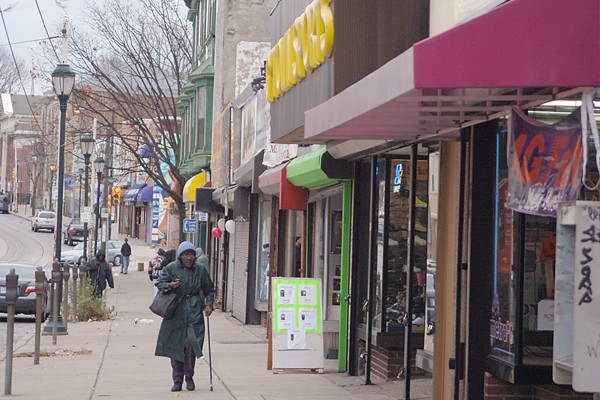How will planned zoning changes impact Germantown?
Zoning code reform doesn’t sound very sexy. But all that esoteric talk of “allowed uses” and “C2 districts” can determine how bike-friendly a city is, whether a gun shop can open in your neighborhood, or how urban farms operate.
Philadelphia’s Zoning Code Commission is currently finalizing a whole new draft of the city’s zoning code, which will go to City Council next year. In this short series, PlanPhilly will analyze how the new code affects neighborhoods in the Northwest.
A bill that keeps beauty shops, wig stores and nail salons out of Germantown seems about as enforceable as one disallowing yoga studios in West Philly.
Yet, in 2008, City Council passed a bill creating the “Lower and Central Germantown Special District Controls,” a zoning overlay that prohibited any new barber shops, beauty shops, nail salons, wig stores, cell phone stores, general stores and furniture shops throughout much of Germantown.
Yes, the bill theoretically does apply to Germantown and Chelten avenues, and you can see how well it’s working.
If the Zoning Code Commission’s reform passes, this is one of the many parts of the current code that’ll get booted. In fact, the ZCC vaporizes many overlays, which are a huge part of the present code — there are nearly 50, the result of some 200 pieces of City Council legislation over the years. (Read more about how the zoning code affects overlays in other parts of the city on PlanPhilly.)
According to the 2008 bill, the aforementioned types of businesses are “not necessarily offensive by themselves, [but] when concentrated within an area, tend to contribute to the deterioration of the economics and aesthetics of the area.” The goal of the legislation was to curb declining property values, preserve historical integrity and grow the economy in Germantown.
Despite the bill, new businesses of this stripe have set up shop in the neighborhood since ’08. According to records from the Department of Licenses & Inspection, Triple One Nail Salon opened at 111 W. Chelten Ave. in 2009, and Cricket Wireless, a cell phone company, moved in the same year at 200 W. Chelten Ave.
Perhaps these business owners bypassed the overlay through sheer doggedness. By the same token, developers with less patience (or resources) likely didn’t jump through such zoning hoops, or may have skipped to another neighborhood. This aspect of the reform is likely to please them, though maybe not community groups.
Another part of the present code that gets the ax is the overlay for Neighborhood Commercial Revitalization Areas, one of which is in Germantown. The ZCC notes that they “have been removed as the city considers whether these controls, which were adopted almost 30 years ago, remain relevant and necessary.”
Sometimes, those controls can be unnecessarily repetitive. For instance, the overlay for revitalization areas prohibits billboards, but so does the overlay for historic districts — which also applies to Germantown. So what’s the point of saying the same thing twice?
A major goal of zoning reform is to eliminate such confusion and bloating.
Conversely, a part of the zoning code reform that remains almost completely unchanged locally is the Wissahickon Watershed Overlay, a set of development standards that are meant to prevent erosion and improve water quality. It’s one of the only overlays that the Zoning Code Commission didn’t hack in its draft — because while neighborhoods change, flooding in the Northwest never does.
And urban farmers in the neighborhood have a lot to consider about the zoning code reform.
For instance, market farms and community gardens — such as the Weaver’s Way Co-op farm or the Wyck and Grumblethorpe farms, all in Germantown — must have a permanent fence around their perimeters. Any food that comes from these farms must be sold either on site or in a location where retail sales are permitted, which may affect the organizations’ missions to serve communities that typically lack access to fresh food.
And all farmers markets throughout the city must have two parking spaces.
Follow these links for more on how the proposed code changes will impact Manayunk and Chestnut Hill. And check back tomorrow for updates on residents’ reactions.
WHYY is your source for fact-based, in-depth journalism and information. As a nonprofit organization, we rely on financial support from readers like you. Please give today.
How will planned zoning changes impact Germantown?

Zoning code reform doesn’t sound very sexy. But all that esoteric talk of “allowed uses” and “C2 districts” can determine how bike-friendly a city is, whether a gun shop can open in your neighborhood, or how urban farms operate.
Philadelphia’s Zoning Code Commission is currently finalizing a whole new draft of the city’s zoning code, which will go to City Council next year. In this short series, PlanPhilly will analyze how the new code affects neighborhoods in the Northwest.
A bill that keeps beauty shops, wig stores and nail salons out of Germantown seems about as enforceable as one disallowing yoga studios in West Philly.
Yet, in 2008, City Council passed a bill creating the “Lower and Central Germantown Special District Controls,” a zoning overlay that prohibited any new barber shops, beauty shops, nail salons, wig stores, cell phone stores, general stores and furniture shops throughout much of Germantown.
Yes, the bill theoretically does apply to Germantown and Chelten avenues, and you can see how well it’s working.
If the Zoning Code Commission’s reform passes, this is one of the many parts of the current code that’ll get booted. In fact, the ZCC vaporizes many overlays, which are a huge part of the present code — there are nearly 50, the result of some 200 pieces of City Council legislation over the years. (Read more about how the zoning code affects overlays in other parts of the city on PlanPhilly.) READ MORE
WHYY is your source for fact-based, in-depth journalism and information. As a nonprofit organization, we rely on financial support from readers like you. Please give today.





